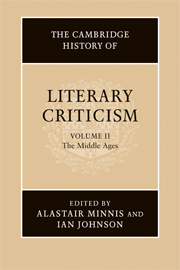Book contents
- Frontmatter
- Introduction
- I THE LIBERAL ARTS AND THE ARTS OF LATIN TEXTUALITY
- II THE STUDY OF CLASSICAL AUTHORS
- III TEXTUAL PSYCHOLOGIES: IMAGINATION, MEMORY, PLEASURE
- IV VERNACULAR CRITICAL TRADITIONS: THE EARLY MIDDLE AGES
- 9 Medieval Irish literary theory and criticism
- 10 Anglo-Saxon textual attitudes
- 11 Literary theory and practice in early-medieval Germany
- 12 Literary criticism in Welsh before c. 1300
- 13 Criticism and literary theory in Old Norse-Icelandic
- V VERNACULAR CRITICAL TRADITIONS: THE LATE MIDDLE AGES
- VI LATIN AND VERNACULAR IN ITALIAN LITERARY THEORY
- VII BYZANTINE LITERARY THEORY AND CRITICISM
- Bibliography
- Index
- References
10 - Anglo-Saxon textual attitudes
from IV - VERNACULAR CRITICAL TRADITIONS: THE EARLY MIDDLE AGES
Published online by Cambridge University Press: 28 March 2008
- Frontmatter
- Introduction
- I THE LIBERAL ARTS AND THE ARTS OF LATIN TEXTUALITY
- II THE STUDY OF CLASSICAL AUTHORS
- III TEXTUAL PSYCHOLOGIES: IMAGINATION, MEMORY, PLEASURE
- IV VERNACULAR CRITICAL TRADITIONS: THE EARLY MIDDLE AGES
- 9 Medieval Irish literary theory and criticism
- 10 Anglo-Saxon textual attitudes
- 11 Literary theory and practice in early-medieval Germany
- 12 Literary criticism in Welsh before c. 1300
- 13 Criticism and literary theory in Old Norse-Icelandic
- V VERNACULAR CRITICAL TRADITIONS: THE LATE MIDDLE AGES
- VI LATIN AND VERNACULAR IN ITALIAN LITERARY THEORY
- VII BYZANTINE LITERARY THEORY AND CRITICISM
- Bibliography
- Index
- References
Summary
Moððe word fræt. Me þþt þuhte
wrætlicu wyrd, þa ic þþt wundor gefrægn,
þþt se wyrm forswealg wera gied sumes,
þeof in þystro, þrymfþstne cwide
ond þþs strangan staþol. Stþlgiest ne wþs
wihte þy gleawra, þe he þam wordum swealg.
(Riddle 47, The Exeter Book)In the fifth century CE, the erstwhile colony of the Roman Empire known as Britain became home to the Angles, Saxons and Jutes, Germanic tribes moving across continental Europe in what has been somewhat romantically characterised as the ‘Age of Migrations’. Pushing the Romano-British and Celtic inhabitants of Britain westward and northward, these tribes rapidly consolidated their hold over the island, which they soon termed engla-lond, ‘land of the Angles’ (and hence ‘England’). The Germanic dialects they brought with them developed into a language that they called englisc, ‘English’. Modern scholarship terms this language ‘Old English’ (in distinction from ‘Middle English’, which developed after the Norman Conquest of 1066), or, sometimes, ‘Anglo-Saxon’, after the two major tribal groups, while ‘Anglo-Saxon England’ refers to England between the Saxon Advent and the Norman Conquest.
Anglo-Saxon England was one of the earliest European cultures to produce a substantial corpus of vernacular prose, alongside a flourishing monastic literacy in Latin and a robust tradition of vernacular poetry in the alliterative Germanic style. Much of this writing has survived in the dialect of Old English that philologists distinguish as ‘late West Saxon’. Both prose and poetry were used for narrative, hagiographic, exegetical and hortatory purposes.
- Type
- Chapter
- Information
- The Cambridge History of Literary Criticism , pp. 310 - 323Publisher: Cambridge University PressPrint publication year: 2005



